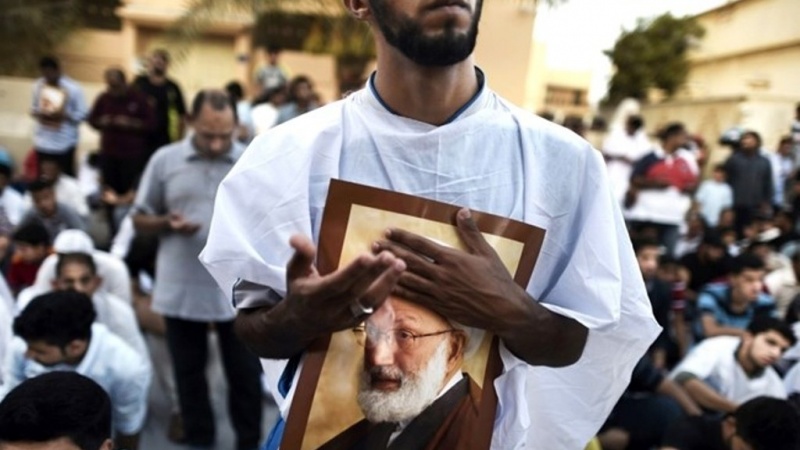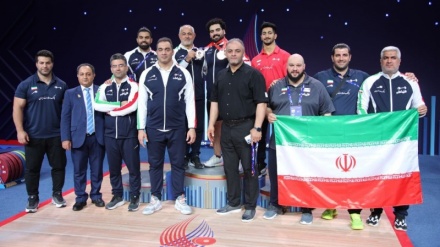Western-backed Saudi onslaught against Bahrainis continues
Under the command of Saudi Arabia, the Aal-e Khalifa regime in Bahrain is on a new brutal crackdown spree on peaceful protesters.
The repressive Aal-e Khalifa minority regime, with the help of the Saudi Wahhabi clique and with approval from the US and Britain, is continuing its crimes against humanity in Bahrain, where members of the long-suppressed Shi’a Muslim majority are being randomly shot and killed, and arrested and tortured, for their peaceful demand for restoration of their birthrights. Here is excerpts from an article in this regard by Ms. Marwa Osman, a PhD Student and University Lecturer at Beirut’s Lebanese International University.
Under the command of Saudi Arabia, the Aal-e Khalifa regime in Bahrain is on a new brutal crackdown spree on peaceful protesters, rendering citizens stateless and condemning them to death.
Senior Bahraini religious leader, Ayatollah Sheikh Isa Qasim, who drafted Bahrain’s constitution in 1973, was last week given a one-year suspended sentence and a fine of one hundred thousand Bahraini dinars, equivalent to $265,000. Also confiscated from his account was the Khoms or religious donations from the community for the help of poor sections of the society, as well as funds and property used by religious sciences students of the Islamic Awareness Institution. In June last year, the regime in Bahrain had illegally stripped Sheikh Qasim of his citizenship, accusing him of using his position to promote what it called violence. The decision left him stateless in his own homeland and at risk of deportation, prompting supporters to stage a sit-in outside his home. However, this sit-in turned into a war zone when on Tuesday, May 22, the Bahraini Interior Ministry announced a security operation had begun in Diraz town where the Sheikh is based. The raid which targeted the house of Sheikh Isa Qasim triggered clashes, with officers opening fire at demonstrators.
The question is: Why is Bahrain crushing the peaceful sit-in?
The answers are obvious.
It all began in February 2011, when more than 200,000 Bahraini citizens set up camp at what was the then the landmark Pearl Roundabout in the capital Manama to call for fundamental government reform. Inspired by the uprisings in Egypt and Tunisia, Bahrainis from all walks of life withstood government raids and political arrests during their month-long occupation of the iconic site. As a result of the movement’s resilience and popular following, it appeared that change would come to Bahrain.
However, in March 2011, the Saudi Arabian military rolled across the causeway to assist the Bahraini regime in a brutal crackdown on peaceful dissent. These troops formed the core of the Peninsula Shield, the Persian Gulf coalition force which the ruler Sheikh Hamad bin Isa Aal-e Khalifa invited into Bahrain to turn the tide as his security forces lost control of the streets. So basically the Saudis would not allow any form of reform to take place in what they view as their Bahraini “backyard” in fear of it igniting similar demands inside the ruling territories of Aal-e Saud.
It did not take too long for the Saudi authorities to point a finger at Iran, and accuse it of having influence over the protesters, the vast majority of whom were Shi’a Muslims. This could not be farther from the truth. As was well documented by the Bahrain Independent Commission of Inquiry, which was established by Sheikh Hamad himself to investigate human rights abuses in 2011, Iran had no involvement in Bahrain’s uprising. In fact, the protest movement encompassed the sectarian divide, uniting both Sunni and Shi’a citizens in their demand for reform and an end to authoritarian rule.
The tiny Persian Gulf island of Bahrain has been a focal point and offers an explicit glimpse into Saudi Arabia’s crave for control and bigotry. Saudi Arabia’s security depends on maintaining the status quo, and this is what the Saudi Foreign Ministry said on May 24 claiming security and stability of Bahrain is an integral part of the security and stability of Saudi Arabia and the Persian Gulf Cooperation Council member states.
An overthrow of the Aal-e Khalifa family and the rise of what the Saudis see as a pro-Iranian or even a simply anti-Saudi Bahraini government would be catastrophic for Saudi Arabia’s security and its hegemony over the Persian Gulf States. By default, this means that the Aal-e Saud dynasty is afraid to see a system of governance for the people and by the people like the one in Iran for instance. Otherwise, why would a peaceful sit-in in front of a Sheikh’s house be of any threat or danger for the Bahraini regime?
It is here that the link between the crisis in Bahrain’s Diraz and the brutalities being unleashed in Awamiyah by the Saudi in the eastern part of mainland Arabia, comes to the fore.
It is impossible to exaggerate the level of paranoia that exists in the minds of reactionary Arabs about the supposed threat from Shi’a Muslims and Iran. In Saudi Arabia the paranoia is comprehensive. With a sizable Shi’a Muslim population, mainly in the key oil-producing east, any assertion of Shia rights is embroidered into an insurgency. Shi’a Muslims form a local majority in the oil-rich Eastern Province, through which about ten percent of the world’s oil is produced daily, but which does not benefit them. Beginning with the popular uprising in the Qatif region in 1979, the Saudi ruling family has been wary of the Shi’a Muslim majority in the Eastern Province which has close ties with Bahrain’s Shi’a Muslims. Though many Shi’a Muslims in these regions do not identify with Iran, the perception of Iranian influence among Shi’a Muslim remains in Saudi minds.
Shi’a Muslim groups first organized themselves in the early 1970s as IFLB or “The Islamic Front for the Liberation of Bahrain”, following Bahrain’s independence from Britain. Its aim was to end the dubious rule of the Aal-e Khalifa family and establish an independent Bahraini state. The group was behind the 1981 failed coup attempt, which was quickly blamed on Iran, although it is highly important to note that it was not Iranian interference that brought about the coup attempt in Bahrain. The IFLB had received support from Bahrain’s Shi’a Muslims in the north in Diraz and in Aali. With 73 people on trial for the coup attempt, the regime had to be careful not to stimulate outrage among the Shi’a Muslim majority, yet went ahead and suppressed demonstrations surrounding the trials.
Associating Bahrain’s protests with the alleged Iranian interventionist plans in the Arabian Peninsula is a mischievous move by Aal-e Saud and Aal-e Khalifa regimes, since it provokes sympathy of the big powers, particularly the US and UK, to help Manama leaders to provide legal covers for their attempts to curb waves of pro-reform demonstrations.
The primary US approach in response to the Bahraini people’s protests was to bolster the Aal-e Khalifa regime with weapons and international support, lest we forgot, Bahrain is also home to the US Fifth Naval Fleet. Therefore, efforts to inflame the consecutive US administrations against Iran’s regional role and influence is designed to urge Washington to intervene in Bahrain’s crisis.
Meanwhile, British arms sales to Bahrain have increased significantly over the past six years, while in the background abuse against peaceful demonstrators has continued. Between February 2011 and September 2015, the UK has done deals with Bahrain worth 45 million pound sterling, covering arms such as machine guns, assault rifles, and anti-armor ammunition, according to CAAT or the “Campaign Against Arms Trade” organization. The total for the three years before the uprising was 6 million pound sterling.
The current brutal clampdown followed by a deadlock marked by ongoing anti-regime demonstrations and failure to deal with the forthright Sheikh Isa Qasim and before him, Sheikh Ali Salman, the leader of the now dissolved al-Wefaq parliamentary group, shows the attitude of the anti-Iran policy. This is regularly followed by Aal-e Khalifa rulers in association with some member states of the Persian Gulf Cooperation Council headed by Saudi Arabia to cover up their collective cruelties against the opposition in Bahrain and similarly in Qatif.
AS/EA



